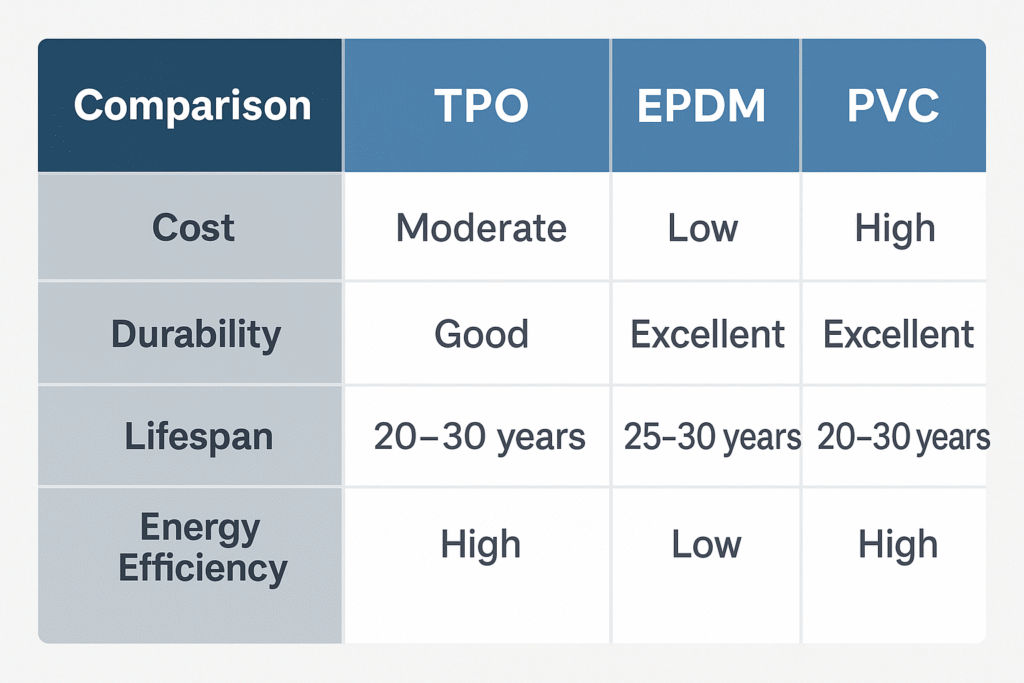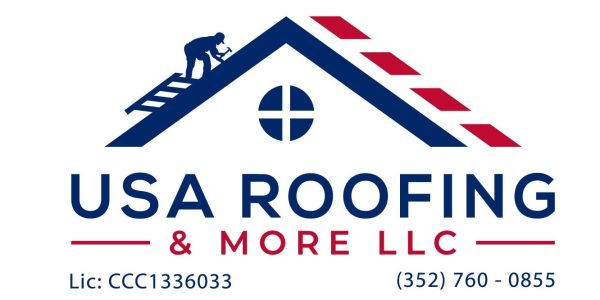Home » TPO Roofing
TPO Roofing Services in Dade City, FL
What is TPO roofing?
TPO (Thermoplastic Polyolefin) is a single-ply membrane roofing system designed for flat and low-slope roofs. It’s heat-welded at the seams, creating a watertight, energy-efficient barrier that stands up to Florida’s extreme heat and storms.
TPO has become one of the most popular choices for commercial, industrial, and multi-family buildings thanks to its affordability and performance
Why should I choose TPO roofing?

TPO offers several advantages over traditional flat roofing systems:
- Energy-efficient: Its reflective white surface reduces heat absorption, lowering cooling costs.
- Durability: Resistant to tears, punctures, and UV rays.
- Waterproof seams: Heat-welded seams are stronger and more watertight than adhesives.
- Cost-effective: More affordable than PVC, but with many similar benefits.
- Low maintenance: Requires fewer repairs compared to older flat roofing options.
How long does TPO roofing last?
With proper installation and maintenance, TPO roofs typically last 20–30 years. In Florida, regular inspections and prompt repairs can maximize lifespan despite heavy sun, rain, and storm conditions.
How much does TPO roofing cost in Dade City?
TPO is one of the most affordable flat roofing systems. Costs depend on roof size, thickness, and installation method:
- 20 Mil – 45 Mil Thickness: Budget-friendly, shorter lifespan
- 60 Mil Thickness (standard): Balance of cost and durability
- 80 Mil Thickness: Premium durability for high-traffic or high-heat roofs
Average installed costs range from $5 to $10 per sq. ft. in Florida, depending on complexity.
What does the TPO installation process look like?
1. Inspection & prep
Remove old roofing if necessary, repair deck, and install insulation.
2. Lay membrane
TPO rolls are positioned across the roof surface.
3. Heat-weld seams
Specialized hot-air welding fuses seams for watertight protection.
4. Secure edges & flashings
Termination bars, adhesives, or mechanical fasteners hold the system in place.
5. Final inspection
We test seams, drainage, and ensure the system is sealed.
TPO vs Other Flat Roofing Options
TPO vs EPDM
TPO is more reflective and energy-efficient, while EPDM is more flexible.
TPO vs PVC
PVC is more chemical-resistant, but TPO is more affordable for most projects.
TPO vs Modified Bitumen
TPO is single-ply with welded seams, while modified bitumen is multi-layer asphalt-based.
Frequently Asked Questions About TPO Roofing
Is TPO good for Florida weather?
Yes — its reflective surface helps combat Florida heat, and welded seams resist heavy rain and wind.
Can TPO roofing be installed over an existing roof?
Often, yes. Depending on the condition of the current roof, TPO can be installed as an overlay, saving time and cost.
How do I maintain a TPO roof?
Schedule annual inspections, clean debris, and ensure seams remain sealed. Repairs are simple when handled early.
Is TPO better for large or small buildings?
Both — while it’s most popular for warehouses, retail centers, and office buildings, TPO is also a great option for homes with flat roof sections.

Why choose USA Roofing and More for TPO installation?
- Commercial roofing experts serving Dade City and beyond
- Licensed & insured installers trained in single-ply systems
- High-quality TPO membranes in multiple thicknesses
- Energy-efficient solutions tailored to your building
- Free estimates and transparent pricing

